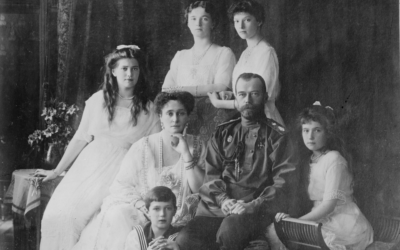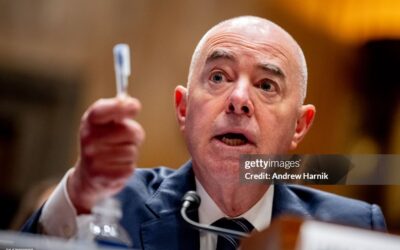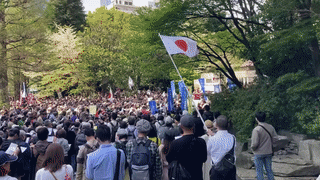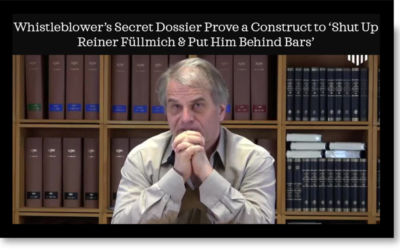NER: Rufo is such an elegant and informed raconteur, that you not only learn, but are entertained by his assessment of CRT and the generally destructive Democrat policies. Video is 36 minutes, with a transcript.
https://www.theepochtimes.com/christopher-rufo-on-critical-race-theory-a-bankrupt-and-elite-ideology-subsidized-by-public-dollars_4087143.html
“If they are committed to lying to parents, even in the face of overwhelming evidence, what else are they lying about?”
At the National Conservatism Conference in Florida, we sat down with Christopher Rufo to discuss the Virginia gubernatorial race and the growing coalition of parents working to remove critical race theory from schools.
Rufo is a writer for City Journal, a senior fellow at the Manhattan Institute, and a documentary filmmaker. He is perhaps best known for his work exposing the spread of critical race theory-based materials and training across America’s public and private sectors.
This interview was filmed a day before the 2021 elections.
Update: The Loudoun County School Board disputes it covered up the sexual assault that took place in a school bathroom.
Below is a rush transcript of this American Thought Leaders episode from Nov 4, 2021. This transcript may not be in its final form and may be updated.
Jan Jekielek: Chris Rufo is such a pleasure to have you back on American Thought Leaders.
Chris Rufo: It’s great to be with you.
Mr. Jekielek: Chris, I’ve been of course watching your social media feed, where you communicate extensively and in great detail, I might add. You’ve been focusing on the Virginia political race. I almost characterize it as beyond politic. Does that make any sense to you when I say that?
Mr. Rufo: Explain.
Mr. Jekielek: Well, so I feel like in typical political races there’ll be basically the issues will be thrown around. To me, you have a middle of the road guy that’s being portrayed as some kind of, I don’t even like to say the word.
Mr. Rufo: Yeah.
Mr. Jekielek: Right. And you have just some patently, obviously false assertions being made that are of profound consequence to society at large. Right? So it just feels like it’s at another level than what I typically see in political races.
Mr. Rufo: Yeah. I’m feeling the same instinct. I think you might even call it a meta politics. So it’s a level of politics that is abstracted and above the typical horse race. So typically you have candidates, they debate, they put out ads, they attack one another, they put out their closing messages. We’re going to do this, this guy’s going to do that and then they hold the election.
But there are a lot of underlying themes and social processes that are at play in this race. And I’m the same way. I don’t typically follow the campaigns and the polling and the numbers. But for me, my interest in the issue of critical race theory is deeply enmeshed in this actual horse race campaign.
So for me, it’s a symbol of the power and potency and reach of this issue that I’ve been working on, critical race theory.
In addition to being really a test on what is the actual hard nose political messaging around this? And you get Glenn Youngkin drawing on this widespread frustration at critical race theory in the curriculum, at some of the corruption in the school boards. And then you get Terry McAuliffe and his allies in the media saying none of this exists. This is a fantasy, it’s a dream, it’s an illusion.
And taking things that I’ve provided documented hard source evidence and just simply running around it because they don’t have a good argument on this issue.
Mr. Jekielek: It’s funny. I almost never cover political races. This is just a fascinating microcosm, I guess, to some extent a lot of things that are happening in the rest of the country. Right. But one point which really struck me is just simply this idea of whether parents should have control over their children’s education. I mean, it seems like me, that’s a very majoritarian position across the spectrum, political spectrum. I’m just shocked this is a topic in this election.
Mr. Rufo: Yeah. I mean, it’s been a conservative point for many years that the school boards, the teachers unions, the bureaucracies that are involved in education want to have greater control over your kids. It’s another thing though to have a democratic candidate for governor come out and say it, parents should not have control over what’s taught in the classroom.
And then actually double down, even in the very last hours before the election. He’s saying, everybody was applauding when I said that, I double down, I don’t disavow the statement. School boards, bureaucrats, experts, should decide for children what their education is and parents should stay out of it.
And it’s a huge shift because you have even thinking back to the Clinton years, Clinton famously advocated for a return to school uniforms as a centrist and very popular idea where he was trying to appeal to this broad middle. Whereas McAuliffe is really huddled in the corner with people who truly and directly believe that parents are an impediment to the development of correct politics, that parents are repressive and patriarchal in relationship with their kids, and that the state should take greater authority and almost unrivalled authority over the development of kids beginning in pre-kindergarten at three, four, five years old.
And so the Virginia voters have a choice, he’s laid it out clearly. And obviously it’s not the only issue, although it is the most important issue according to voters.
Mr. Jekielek: Well, and so how is this connected to critical race theory? It’s maybe obvious to some, but it’s also a million dollar question to others, right?
Mr. Rufo: For two reasons. One, is substantively the suburban counties around DC and Virginia have spent a lot of time and money investing in critical race theory, pedagogies. So actually teaching it as a direct subject, but also teaching through it, using it as a pedagogical framework or lens, incorporating the insights and principles of critical race theory into the everyday teaching.
And this is corroborated, proven by documents even the last time Terry McAuliffe, the Democrat was governor, his own department of education was promoting critical race theory to schools in 2019 under this current Northam administration, the superintendent endorsed critical race theory in a letter to all the superintendents around the state.
And then in places like Loudoun and Fairfax County, they’re hiring consultants at $625 an hour in one instance, to help them implement critical race pedagogies.
And there are real grievances on behalf of parents to say, hey, wait a minute. What we’ve seen because of the pandemic. What we’ve seen because of our document requests is that the suburban schools, again, around DC, Fairfax County, Loudoun County, are promoting a malicious and intentional pedagogy that’s designed to reduce people to a racial category, assign guilt and blame to individuals based on their relationship, whether it’s skin colour or ancestry with historical crimes.
And then in one really horrible incident, the school board in Loudoun County was covering up a sexual assault and then another sexual assault. And so when you add that together, critical race theory with safety, with an out of control bureaucracy, with secrecy, actually the Loudoun County superintendent even requested undercover police officers to monitor parents who are expressing disagreement at school board meetings.
When you put that all together, Virginia has become this flash point in the critical race theory debate with parents mobilizing to say, we want to get a great education. We want to teach a full, accurate, and honest look at American history, but we don’t want you essentializing our kids. We don’t want you filling our kids with either guilt and shame or pessimism and despair.
And McAuliffe, other institutions, have been caught off guard by this. They have no response, so they’ve reverted to this very defensive strategy of just denial. Deny that it happened, deny that it exists, deny the documents, deny the evidence, deny the parents.
And they think that because in Virginia they’re the majority structurally in a partisan way, they think that they can simply just ignore the issue. But if the polls emerge as they are trending, which is in favour of these parents, that proposition could be easily proven false.
Mr. Jekielek: Maybe you can actually update me because I don’t know what the newest reality is around these sexual assaults that you’re describing. Has that been demonstrated unequivocally that it’s true, where does this stand?
Mr. Rufo: That’s right. It’s in the Loudoun County public schools, a young male, a gender fluid male dressed in a skirt, according to court transcripts and reported stories, initiated a sexual encounter with a female student with whom he had had a previous encounter, but then was rebuffed. And then forcibly assaulted this young girl, I think 14, 15 years old. And I mean a horrific thing.
But even adding a compounding evil, I think, is that the school board rather than immediately take this alleged at that time predator out of the schools, simply transferred him to another school where he committed another assault. And then to add even more insult to the victims and victims’ families, the school superintendent lied about it, covered it up, and then the school board officials denied that it even happened.
And so you have this father who is destroyed, deeply hurt, the father of the young girl, understandable lashing out at a school board meeting and saying, you’re lying. My daughter was assaulted, you’re lying about it. And you need to come clean about what you’ve done, putting other kids in danger. And he was restrained by police and then portrayed as a domestic terrorist.
I mean, adding this other layer of cruelty to a situation that was already deeply corrupting and deeply wrong. And so parents are not only saying what’s happening with the curriculum is hurting our kids intellectually, morally, as far as their pursuit of knowledge, but actually you’re putting our kids at physical danger and then covering it up. And this has now been proven in court.
The young man was found guilty of this crime, admitted it to law enforcement. And so there’s this reckoning where people are saying, if we don’t have a sense of safety in our schools, you’re really losing the legitimacy of your authority.
Mr. Jekielek: You’re suggesting here that this is all connected, right? The critical race theory element, this cover up, there’s this connected ideological bent, I guess?
Mr. Rufo: Yeah. I think that’s right. And it’s substantiated by the documented evidence. We know that they lied about the sexual assault. We know that they cover it up and then we know that they’ve maintained this absurd state of denial. You can go on the Virginia Department of Education website right now.
They specifically endorse critical race theory. They call it a best practice. They endorse literature that says critical race theory in education. They derive their definitions for their equity program explicitly from critical race theory. It’s on their website right now and yet they’re maintaining this denial.
So when there’s denial across these two axes, one is school safety, sexual assaults, and the other one is curriculum and critical race theory pedagogy. You have to wonder it’s the same people perpetuating the lie, covering up the truth. What is their motivation?
And if they are committed to lying to parents, even in the face of overwhelming evidence, what else are they lying about? What else are they covering up? What are their real intentions? And these are all questions that are getting asked by parents.
They’re submitting Freedom of Information Act requests. They’re discovering some really ugly stuff in there, including the superintendent of this school district who was requesting undercover police officers to monitor parents.
And to me, this is thankfully the Sheriff’s office rebuffed it. Said, no, we’re not going to provide that. That’s overkill, that’s outrageous. That’s an infringement on the liberties and rights of these parents, but had these parents not requested the documents, we wouldn’t have even known that it was happening.
Mr. Jekielek: It’s almost almost hard to believe, right?
Mr. Rufo: It would be almost hard to believe absent the hard evidence. And with the leadership of actually a former Wall Street Journal reporter who lives in Fairfax County, Asra Nomani, you probably know Asra. She said you know what? I’m going to apply my journalistic skills to find out exactly what’s going on, because The Washington Post isn’t going to do it.
And now they’ve forced not only change within the school district, they’ve rallied parents and they’ve put pressure now on The Post to at least reluctantly start reporting about these issues.
Mr. Jekielek: It’s funny how fate plays out that someone like Asra Nomani happens to be in a district like this, because from other, I guess, realms of inquiry she’s not the type that gives up easily.
Mr. Rufo: She’s not. She’s fierce and we’re seeing Asra’s ferociousness and tenacity. I see it now everywhere because there are these predominantly mothers that are engaging in hundreds and now more than a thousand school districts across the country because they’ve been awakened to a threat against their kids.
And when you step between a parent and child or a mother and child, and that mother fears that you’re putting her kids in jeopardy, whether it’s academically or morally or physically even, they’ll stop at nothing.
And so we’ve seen this grassroots revolt against critical race theory in schools, against corrupt school boards that are pushing ideologies and then lying about it. And they’re in for a reckoning because like Asra great symbol of this fight, these parents may not have a lot of time, they’re busy. They may not have a lot of money, they’re middle class people, but what they have is courage and passion. And we’re seeing that play out in, I think, a beautiful way right now.
Mr. Jekielek: So maybe very briefly for those that haven’t been initiated, many of the viewers of the program are aware, but what is the thread of actual critical race theory to children? What do these mothers understand that’s activating them like this?
Mr. Rufo: Critical race theory does two things. One, the message that it delivers is a message of deep cynicism and oftentimes hatred of the United States. Critical race argues that the United States is a fundamentally racist and white supremacist nation and that all of our constitutional rights and liberties and institutions preach freedom inequality, but that’s actually an illusion.
Our country is still a structure and an expression of racial domination, in the same way it was 100 or 200 years ago. So recast American history in that light.
But secondly, as it’s applied to education, the actual pedagogy, the actual teaching method, and they’ll do this explicitly. In my reported stories, I’ve demonstrated this with again, source document reporting. They’ll take children as young as first grade, kindergarten and say, if you are white, male, Christian, heterosexual, et cetera, you are inherently oppressive.
And if you are a racial gender or sexual minority, you are inherently oppressed. And then trying to use this framework to fill kids with either guilt and shame or pessimism and despair. And so it is destructive cognitively and emotionally. It distracts from and actually inhibits any academic achievement of even basic skills, like literacy, and mathematics. And then presents our society as something that is fundamentally evil and oppressive.
I think what it does is that it creates a transmission belt for its own political goals. It displace the traditional academic goals of knowledge and achievement and excellence with political goals of activism and a nihilistic racial philosophy that argues that the deck is stacked against people. And there’s no hope except for revolution.
And that to me is not only factually inaccurate, but I think it’s dangerous both at the social level and at the individual level because it really is through the testimony of many parent hurting their kids.
Mr. Jekielek: I can’t tell you how many people, including some that have come on this show who have told me that one of the silver linings of COVID education I.e. through Zoom is that they got to hear what their kids were actually being taught. They wouldn’t have known otherwise. Right. That’s one side. The other side though, and also from people that have appeared on this show is that it’s really this time period that has accelerated the implementation of critical race theory and related pedagogy.
Mr. Rufo: That’s right.
Mr. Jekielek: We’ve seen both sides of this. How does this play out?
Mr. Rufo: You’re exactly right. They’ve been actually operating in parallel, very interesting. And I think that it’s because of COVID, obviously everything shut down because of COVID and then the death of George Floyd, in addition to the environment of COVID, which was destabilizing, people were at home, people were out of work, for example, sparked off riots.
I think the social pressure was very high. And so you had these two tracks and then schools as the third part of this felt they needed to react to the death of George Floyd by accelerating the critical race pedagogies.
And so these three things together in an interlocking way, created something new in education. It created unprecedented political activism in schools. At the same time it was creating unprecedented and really unique transparency for parents. Those two things met and then through my efforts and the efforts of some of my colleagues who actually nailed it down in reporting.
Again, bringing documents, bringing evidence, bringing videos, bringing PDFs, showing exactly what was happening within these institutions.
It created this combustible mix where parents felt shocked and then angry and then inspired. And that’s why we’ve seen parents all over the country, going to school board meetings, protesting, demanding change, running for office. And if you look at any of the great social movements for conservatives in the post-war era, you’ll notice that always at the beginning, there’s a feeling, there’s a sentiment in the air.
And it has expressed itself, for example, before the Reagan Revolution. In school boards, there was a kind of uprising, an inkling prefigurement. And then since then, when you had the Gingrich Revolution, again, taking the House for the first time in decades.
There was also this uprising in local, small institutions like school boards that served as a pre-figuring element or a symbolic beginning for some broader political change. And I will predict, I’ll go on the record as predicting that we are going to see that change happening in this upcoming election cycle, when Americans really express their political desires.
Mr. Jekielek: So there’s been this phenomenon that I’ve seen some evidence of it, and it’s just been described to me. I wanted to get a sense if you have a grasp of how prevalent this is, but of when people accuse school boards or teachers of basically doing critical race theory practices, or just teaching it in general. It’s being renamed as something else and just doubling down with a different name or?
Mr. Rufo: That’s right. Three-card Monte when they’re shuffling the cards and they’re hiding the cup or whatever is underneath, the little coin, I’m not sure what it is.
Mr. Jekielek: Bowl, yeah.
Mr. Rufo: The bowl, yeah. It’s basically that with language, the bowl is critical race theory and the cups are the various euphemisms. Well, that’s not critical race theory, that’s culture responsive teaching. That’s not critical race theory, that’s diversity, equity, and inclusion. That’s not critical race theory, that’s critical pedagogy. Well, that’s critical whiteness studies.
And so there’s this revolving language system that they use to confuse, that they use to avoid, that they use to obfuscate, and they’re deploying it because they refuse to defend critical race theory on the merits, because even they know that it’s indefensible politically. And so they’re playing this language game, but it’s dishonest? Yeah. Is it unfair? Yeah. But it’s their strategy.
And I think ultimately it’s going to be ineffective because I think busy parents say you know what? I don’t care what you call it, take away the language game. I don’t like when you’re teaching my five year old that he’s inherently oppressive because of the colour of his skin.
When you get it down to that level and you take the language games as an entry move rhetorically, and then put it aside and then hammer them with a specific narrative and evocative image of what you mean, in real, not academic, but real human and middle language.
We’ve seen it tremendous power in that, because you cut out the BS that academics can go in circles around and you have a parent saying, for example, African American parent in Illinois went viral or in Arizona went viral with these school board videos saying, I don’t want you teaching my kid that she can’t achieve anything because of what her parents look like.
You are teaching my kid that she doesn’t have any agency control over her in life, doesn’t have any future, and I reject that. These great clips that we’ve seen. And so from both of those sides, from those of those sides of the coin, when parents speak their experience, there’s power in that. And I think it cuts through those language games.
Mr. Jekielek: So you’re a parent and you’re very, very passionate about this, much as the parents that you’re describing. How did you get into this whole scene? How did you make this your primary objective, I guess?
Mr. Rufo: Well, I saw it a bit when my kids were in school, young around the edges, and then for my family, it’s not so much a problem anymore. We moved to a small town, it’s education is good. We keep close tabs on it, and very happy. But I think that it matches two things that are exciting and motivating to me. One is an intellectual question. What are these theories and ideologies that are driving our politics into this obese of insanity?
Intellectually, what is that? That’s a very exciting question for me. And then matched with not just the theory, but with some actual practice and application. How can we move the world in a better direction? How can we move our country to something higher, to something better, to something more profound and more valuable.
And then we see them coming together in schools as the domain. And you have this really amazing expression of democracy where you’re merging your intellectual interests with this social movement that has emerged organically of parents that need information.
They need vocabulary, they evidence, they need stories, they need strategic advice. And so I can provide that to them through the work that I can do uniquely to me, and then they can take it all over the country and then actually implement these changes, tailored to their specific circumstances and needs in the interest of their real flesh and blood communities.
And so it’s this really exciting process, this exciting dynamic, where we’re merging the political with the theoretical, with the practical, with the communal expression of ideas in a way that is important to people. Because a lot of times you can talk theory, blah, blah, blah. Great, interesting intellectually. But this is an issue that engages at the heart and the gut level.
People have a full expressive reaction to these issues because it affects them in a profound way. And for me, it’s that kernel of meaning that is revealed in this conflict that provides access to something unknown. And I think that’s what we all want to do. Right. We all want to get up right into the edge of the unknown and then rush through it. And that for me is exciting.
Mr. Jekielek: I’ve always found all the materials that you offer to be incredibly practical. I don’t have kids, so I’m looking from the outside, but I do have nephews that I’m very concerned about that are precisely in the school that you might worry about.
Mr. Rufo: Yeah.
Mr. Jekielek: Right. Have you encountered any children that have been, let’s say, educated over some time over decades or indoctrinated would be another term with critical race theory pedagogy?
Mr. Rufo: So, from what I can tell and look, there’s no through my reporting, to the journalistic work, is that this stuff really didn’t hit K-12 schools until about 2010. And at that time it was only in places like Seattle and Portland. Those are the earliest examples that I can find. And so there’s not a lot of evidence. This is really new. There aren’t kids who grew up with critical race pedagogy as their whole educational experience, besides maybe a few at the edges in a place like Portland.
But if we take Portland as maybe an example, early adoption. You have, I think the highest or most developed expression of this ideology in the local politics of Portland, where for example, as our reporter, Andy Ngo has demonstrated through his meticulous documentation of court cases and arrest records.
You’ve had multiple Portland public school teachers teaching even elementary school kids who then put on the pyjamas and the masks and the gloves, and then go riot, commit crimes, and commit acts of political violence and vandalism at night, and then return to the public school in the morning, they’ve been arrested for it.
They’ve been identified. And in some cases they’re still employed by the Portland public schools and surrounding educational institutions. And so the question is when you have someone that is willing to engage in political violence, that is shaping the minds of kids and using a curriculum provided by the district that traffics in critical race theory, critical pedagogy, other critical ideologies, what’s the result? And we don’t know, it’s a limited sample, all the caveats supply.
But we do know that many minors in Portland have been rioting and committing acts of political violence and then getting caught for it in some cases. And so if we use that as not rigorous social scientific evidence, but as maybe just a symbol, we can say that in a cultural environment where these ideologies are dominant within institutions, you may get examples and results like we saw in Portland over the last year, which have been horrific.
Mr. Jekielek: Basically what a number of people that are doing works similar to yours will say is that the goal of this is to create activists for the same cause. And you alluded to this a bit earlier at the earliest age possible?
Mr. Rufo: That’s right. And how do they load their premise? This is the really important question on this issue. Why should someone become an activist? Let’s work backwards. Well, one way to do it is to say, well you know what? If you are part of the systemically racist society and you’ve internalized that racism, then you should, by logic, join the anti-racism or activist movement based on, again, the premise that you are racist, let’s say.
And so what do they do? They actually release these bogus studies that are flimsier than a one ply paper towel that claim to show that children become racist by three to six months old. And that white children and white children only become full fledged, racist, white supremacists, by age four and five.
Department of education in Arizona promoted these materials. Ibram Kendi promotes these materials. Other school districts promote these materials. And so if you accept the premise that children even pre-speech, before they can speak, right, six months old, you can’t talk, are racist. The solution then is to transform them into anti-racism activists, beginning at the youngest level.
And so they have a series of baby books, baby books for pre-reading that push this ideology, A is for Activist. So even taking the alphabet, the basic building blocks of language, pre almost cognition of language. And the number one thing, the title of the book, A is for Activist, not conservative activist. It’s a specific kind of activism. And so that’s the goal, it’s explicit. You don’t have to trust me about it, just look at the material, it’s very obvious.
Mr. Jekielek: This is an anti-racist baby that you’re talking about.
Mr. Rufo: That’s another one. There’s one called A is for Activist. It’s an alphabet book.
Mr. Jekielek: I see. Oh, fascinating.
Mr. Rufo: Amazing. Yeah.
Mr. Jekielek: It’s interesting because something you said earlier, so you’re bullish on this?
Mr. Rufo: Yes. I’m bullish by nature and I’m bullish not because we have a position of power or we have the institutions that we can mobilize against this. We don’t have any of that. But what we do have is the stronger case, we do have some great individual people that are willing to take risks, to stand up for the truth.
And then we have an army of middle Americans, of all regions, of all racial backgrounds, of all social classes that just need leadership. They’re ready to go. They’re ready to fight. They’re ready to win. They’re ready to take action. They just need leadership. They just need vocabulary. They just need evidence.
And the more that we provide that, the more of this great democratic expression we’re seeing. And to me, that’s what it’s about. It’s about, okay, it’s about us, right? We’re in media, we’re on TV, we talk, we should win there too, that’s important.
But ultimately it’s about real human communities that operate at the local level. And it can only operate at the local level where actually our society contains its centre mass. And I think that is still healthy. I think that’s still vibrant. I think that’s still ready to live.
Mr. Jekielek: So something you don’t talk about as much as I guess you used to is that you’re also a documentary filmmaker.
Mr. Rufo: That’s right.
Mr. Jekielek: And you made this amazing film, which I’ll recommend to everyone called America Lost Looking at Three Different Cities. Now, the interesting question is, through the process of making this, what’s the connection to this critical race theory focus that you have right now?
Mr. Rufo: There’s a deep connection. The film I portray life in three of America’s poorest cities, a predominantly white, working class city, Youngtown Ohio, a predominantly black urban neighbourhood in Memphis, Tennessee, and then a Latino and multiracial community in the central part of Stockton, California.
And so what you see is some of the most difficult and desperate conditions in our country, neighbourhoods that have three quarters, or sometimes as high as 90% plus of families are single parent families.
You have the drug trade and the black market is the dominant economic system in these neighbourhoods’ communities. And they’re racked with addiction and violence, other social problems. And the goal of our policy, the goal of our theories, the goal of our activism, in many ways should be to alleviate those problems and to help those people who are… I don’t think oppressed in the traditional sense of a power structure that consciously and deliberately represses them or harms them.
It’s not that, it’s this really awful mix of unintended consequences and social realities that has culminated in these places that are truly hurting. And the reason why I’m so passionate in my belief, the critical race theory is a bankrupt ideology. Bankrupt theory, is that it actually despite its superficial appeals offers nothing for the people in Youngstown, Memphis, or Stockton. It offers nothing for any of them.
It’s really an elite ideology subsidized by public dollars that serves their own elite political and status interests. And if you want to have a serious theory of even race in America, for me the test is if you apply this theory in practice, would it help the people in a place like Memphis, Tennessee, that are really truly struggling and deserve our full care, support, talent, and wisdom.
And if the answer is no, in critical race theory the answer I think is a definitive no. To me it’s not a good theory, because it doesn’t actually help people, real people who are actually in real need.
Mr. Jekielek: It’s fascinating. Any final thoughts as we finish up?
Mr. Rufo: It’s great to be here at The NatCon Conference. It’s good to meet you in person. We just have to keep this conversation going. We have to keep it developing. We have to keep it enlightening people, really to something they didn’t know. And I think it will requires of us to be constantly asking questions. And for me, that’s something that you do very beautifully. You do very well. You’re a great interviewer, very curious, and so I appreciate the time.
Mr. Jekielek: Well, Christopher, such a pleasure to have you on.
Mr. Rufo: Thank you.
[Narration]: Our team reached out to the Loudoun County school board and the campaign of former governor Terry McAuliffe, but we did not immediately receive a response.
Subscribe to the American Thought Leaders newsletter so you never miss an episode.
Follow EpochTV on social media:
Facebook: https://www.facebook.com/EpochTVus
Twitter: https://twitter.com/EpochTVus
Rumble: https://rumble.com/c/EpochTV
Gettr: https://gettr.com/user/epochtv
Gab: https://gab.com/EpochTV
Telegram: https://t.me/EpochTV
Parler: https://parler.com/#/user/EpochTV









0 Comments